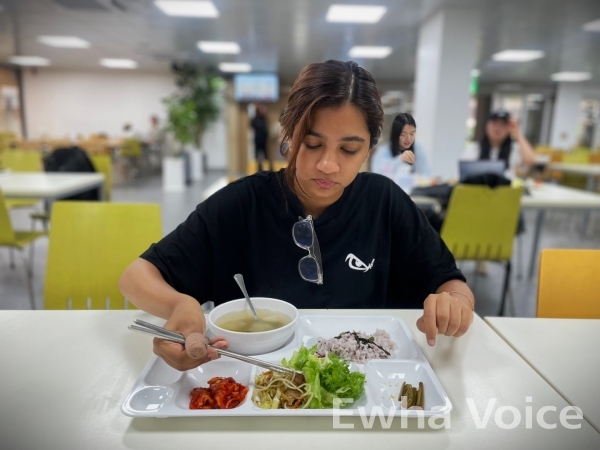
On May 15, Ewha unveiled the much-anticipated launch of the 1,000 won breakfast policy at the I-HOUSE student cafeteria. Students can now indulge in a satisfying morning meal at an affordable price of only 1,000 won.
The new policy represents an initiative that has emerged from a collaborative effort between the South Korean government and the Ministry of Agriculture, Food, and Rural Affairs. The primary objective of this visionary partnership is to tackle the escalating concerns students face when procuring an affordable meal, aligning with the government’s broader agenda of promoting increased rice consumption through effective policy implementation.
With about 200 servings on Monday and 150 servings per day from Tuesday to Thursday, the I-HOUSE cafeteria operates on a first-come, first-served basis.
Hearing the news about the latest policy, several students lined up to get a taste.
Yejin Kim, a junior from the Division of Mechanical and Biomedical Engineering, expressed that the food was satisfactory and better than expected.
“I would give a 10 out of 10 for the overall quality of the food,” Kim said.
Kim explained that before the implementation of the business, she used to skip breakfast or buy simple, but unhealthy meals at the convenience store. Thanks to the business, however, she was able to follow a much healthier diet and procure some knowledge regarding the importance of nutritious meals.
Similarly, Jabin Lee, a junior from the Department of Communication & Media, found the policy beneficial while living lives off-campus near the school.
Lee's options for breakfast were either whipping up a simple breakfast, buying breakfast outside, or skipping it. With the launch of this policy, she was able to start her day with a full stomach.
“Considering both the student’s budget and well-being, the policy is a really big help,” Lee said. “I plan on making regular visits.”
Another student from the Department of Business Administration who wished to stay anonymous agreed that the price was reasonable with the meal itself suitable for a calorie deficit diet. In addition, students are also allowed to get more if the amount of food is lacking. She added that it is good nutrition-wise, and students have a lot of options for just 1,000 won.
“It gives us a full stomach and a full wallet,” she said.
Meanwhile, Akannsha Yadav, a sophomore from the Department of Business Administration, commented that the quality of food was not as satisfactory since there were little to no vegetarian options and the menus did not suit her taste. She explained that she had better food at Hanwoori or other cafeterias.
According to the Office of General Administration’s General Affairs Team, the school has focused on a policy that not only aligns with the government’s objectives but also prioritizes the well-being of the students. Led by Assistant Manager Roh Junghee, the team is dedicated to ensuring that Ewha students have access to a healthy diet and supportive environment to kick start their day with vigor.
Roh emphasized the significance of feedback from students and positive responses for the success of the policy. In a concerted effort to monitor progress, both the school’s president and Roh have been visiting the cafeteria daily. Furthermore, in response to potential high demand, there is a plan to extend the operation period from May 15 to Nov. 30. Additionally, the number of daily servings is expected to increase beyond the current count of 150.
“But this plan solely depends on the students’ active usage of the cafeteria,” Roh stated. “If the number of students does not meet the daily servings with, for example, 100 people a day, it is hard to say that the policy is a success.”
To include the international student’s preferences as well, the cafeteria plans to offer a variety of other options including vegan. Roh further revealed that providing a vegan menu has always been on the table of conversation. With the recent launch of the policy, the cafeteria staff have been busy managing the current menus.
When the policy finally settles among the students, Roh disclosed that implementing vegan options would be the next big priority, and as part of this initiative, the team is considering designating a specific day of the week as “Vegan Day.”
“For example, every Wednesday may be Vegan Day where vegan menus are provided,” Roh said.
The overwhelmingly positive response from students, who have praised the quality and affordability of the meals, demonstrates the policy's immediate impact. With plans to extend the operation period and introduce vegan options in the future, Ewha commits to prioritizing student feedback and improving the dining experience.

